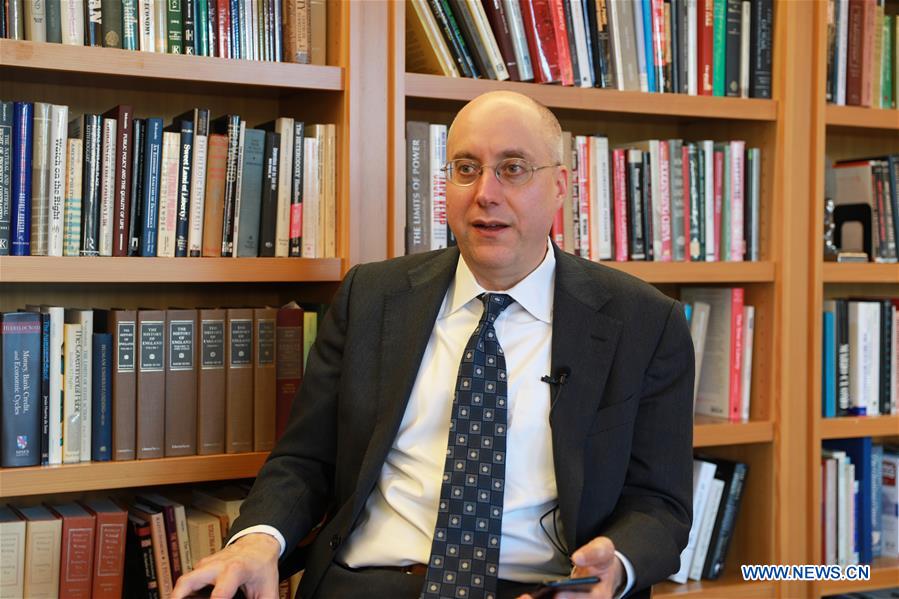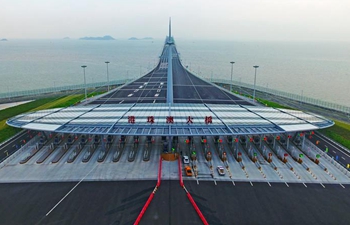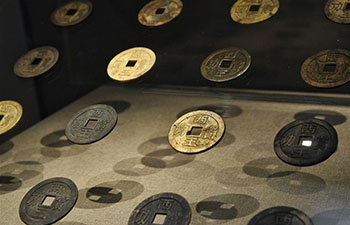
Simon Lester, associate director with Herbert A. Stiefel Center for Trade Policy Studies under Cato Institute, receives an interview with Xinhua in Washington D.C., the United States, on Oct. 18, 2018. The settlement of trade tensions between the United States and China requires the willingness and trust from both sides, trade experts and economists said. (Xinhua/Zhang Yichi)
by Xinhua writers Liu Yanan, Zhang Yichi, Qin Lang
NEW YORK, Oct. 24 (Xinhua) -- The settlement of trade tensions between the United States and China requires the willingness and trust from both sides, trade experts and economists said.
Several rounds of trade talks have been held before and after the United States initiated the imposition of trade tariffs on goods imported from China, reaching no tangible results to reduce the disputes because of Washington's blowing hot and cold.
NO DEAL IN SIGHT
The United States seems not ready or interested in making a deal with China through negotiations. Instead, it is expecting that China may yield under the pressure of high and extensive tariffs.
"I think that the Trump administration believes strongly in its approach to trade and plans to continue these tariffs for the foreseeable future," said Simon Lester, associate director with Herbert A. Stiefel Center for Trade Policy Studies under Cato Institute.
Unless there is a downturn in the U.S. economy, the Trump administration is going to maintain its aggressive trade policy including tariffs, Lester told Xinhua.
But the challenge is that the U.S. economy "is roaring right now" and the country is blind to the impact of the disputes, said Chuck Larson, former U.S. ambassador to the Republic of Latvia and former chairman of the Republican Party of Iowa.
Lester added that both sides need to "sit down and make good faith in negotiating offers" to resolve disputes, which he doesn't think is happening.
"When you have a negotiation, both sides have to give something, and so on the U.S. side, I think the one thing we could do is treating China like we treat everybody else in anti-dumping," Lester suggested.
In the view of Larson, U.S. President Donald Trump wants a deal and could come forward. "I don't encourage China to make a way to come forward. I believe something would be accomplished sooner rather than later."
OVER-CONTROLING TECHNOLOGY EXPORTS
The U.S. eagerness to retain technological supremacy and a lack of trust between the two sides have made the United States tightened, or even over-controlled technological exports to China, experts said.
Larson pointed out that part of the core issues in U.S.-China trade disputes concerns the protection of intellectual property.
The U.S. government uses intellectual property to pursue technology security and then economic power, according to James Mendenhall, former general counsel of the Office of U.S. Trade Representative.
"I think probably the United States over-controls technology," said Henry Levine, senior advisor of Albright Stonebridge Group, adding that concern is growing about "the impact of letting the technology go."
In August, the Foreign Investment Risk Review Modernization Act was signed into law by the U.S. government, allowing the Committee on Foreign Investment in the United States to block foreign acquisition of or investment in U.S. entities involving more than 27 kinds of industrial technologies seen sensitive.
The act brings challenges to mergers and acquisitions by Chinese companies in the United States, as Chinese investment draws special attention, said Amiad Kushner, a partner with law firm Dai & Associates.
The U.S. export controls have major impacts on both Chinese and U.S. companies, as transnational companies may move their research and development to other countries like India to maintain international cooperation, according to George Grammas, a partner with law firm Squire Patton Boggs.
BOTH TO LOSE IN DECOUPLING
Imposing tariffs on hundreds of billions of U.S. dollars worth of goods between China and the United States has sparked grave concern on a possible decoupling of bilateral economic ties, which in the last four decades grew very strong and helped stabilize bilateral relations.
If China and the United States go separate ways and organize their economy against each other, it will be another "lost and alone" and both sides will lose, said Larson.
"I do worry about a decoupling. It's easy to say that we're going to decouple, but it'll be very disruptive and very costly for companies and workers in both countries," Levine said.
A decoupling would make both sides worse off economically, Lester said. "We benefit tremendously from this economic integration. It's bad economics and bad politics in separating ourselves out, in dividing the world into separate camps and alliances."
Levine also criticized the "poison pill" provision in the revamped U.S.-Canada-Mexico free trade agreement, which is believed to be aimed at preventing other countries from signing free trade agreements with China, saying that there's a long way to go before it actually has any real significance.
"China would make itself a more attractive trading partner than the United States," said Gary Horlick, former International Trade Counsel of U.S. Senate Finance Committee and former head of Import Administration of U.S. Department of Commerce.
The U.S. government made similar moves in earlier days of the trade negotiations but didn't see satisfactory results, Horlick added.
WTO SHOULD NOT BE UNDERCUTTED
Besides the trade disputes with China, the Trump administration is also targeting the World Trade Organization (WTO), as Washington refused to allow the appointment of judges to fill vacancies in the WTO's appeals court, the Appellate Body.
The action to undermine the WTO is "terrible," said Levine, also mentioning the U.S. withdrawal from the Trans-Pacific Partnership, calling it a "mistake" of the United States.
A multilateral system like the WTO can only function and progress if major economies all have a strong commitment to concrete actions to open up their economies, Levine said.
He added that substantial reforms to the WTO are going to be very difficult to achieve as major countries are attaching priority to bilateral and regional agreements, which are seen useful in creating competitive pressure to force other countries to open up to the same level.
"We're just kind of stuck if no one's willing to commit to some big new liberalization," he said, calling for strengthening the WTO instead of undercutting it.











